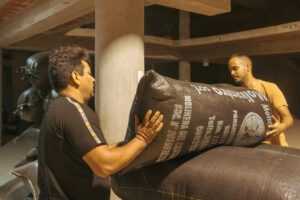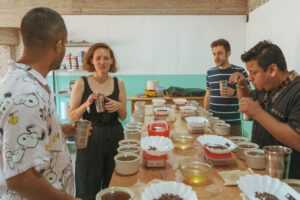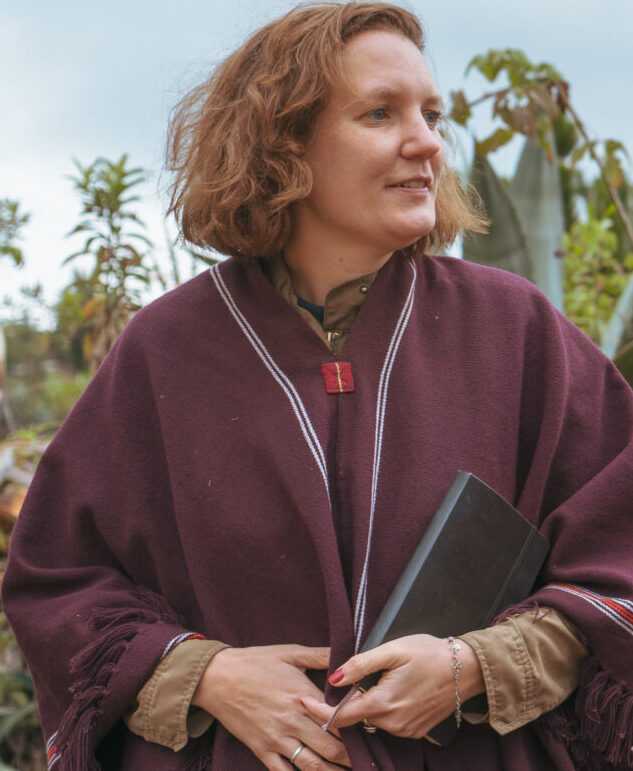MILAN – We have already presented the revolutionary Typica platform, founded by two Japanese and open to the international market, to be the direct link between growers and micro roasters. The project is ambitious, we have analyzed it first from the point of view of the creators and now through the words of the supplier company Cultivar who have joined the network, an enterprise created to support and to accelerate the small-scale growers potential and to facilitate long-term business relations between them and roasters. It has been founded by Lisanne Oonk and Thadros Mellink, and César Garcìa Fernàandez work on the business development.
How did Cultivar find out about Typica?
“We found out about each other via Instagram when Ayane and I (Lisanne) started writing each other in the personal messengers via the application. While talking we soon realised our visions and objectives were very much aligned. Then it was a real coincidence when we found out that we were both based in Amsterdam, so we could easily meet up in person.
We met and we started working right away. It was just in time for the 2020 harvest. Our second meeting was a cupping of all the 2020 harvest micro lots offer. ”
What are the actual benefits of subscribing to this platform?

“From a supplier perspective it is great that Typica has a strong network with many small-scale roasters in Japan, and now in more and more other countries as well. The platform and the automatisation of ordering etc makes it much easier to reach a growing group of small-scale coffee roasters. We really love the idea that anyone interested in what Perù has to offer, can access the coffees they love, even if these are very small quantities.
From a roaster’s perspective, I can imagine that the platform provides access to a wide range of origins in a very centralised way, which works very convenient and efficient. ”
Doesn’t direct contact with growers pose other logistical problems? For example, the transport of the 60 kg bag and its contents, who monitors it, ensuring safety and quality?
“There is a whole world behind buying a bag of coffee, something that many people hardly realise. Before a grower offers one bag of coffee, there is a long process of getting to know each other, visiting the farm, providing information, and giving advice where necessary, investing in the relationship, and building trust. This whole process takes time and needs to be done with care. This is an investment, and sometimes with the risks that the intended collaboration with a farmer household doesn’t work out as hoped (for any valid reason).

In the early moment of the season (from May onwards), farmers come to our warehouse with samples for analysis, so from the beginning of the harvest we provide feedback on their quality. And then when the main harvest really starts, farmers bring in their coffee bags with parchment coffee to our warehouse in small quantities throughout the harvest months. Every delivery, even if it is only 30 or 60 kilos is meticulously monitored in terms of quality; we measure humidity, assist in drying in case that is needed – by facilitating drying space around our warehouse, and we grade the physical quality of the green coffee, and cup it several times.
We always pay our partner farmers directly when they deliver coffee – and once we have determined the quality in our quality department. The higher the physical quality of the bean and the cupping score, the higher price we can commit to upfront. Most of these farmers have high labor costs during the harvest and a lack of access to loans, so
there is the ever-present pressure to buy and pay farmers on the day they arrive at the warehouse with their coffee bags. They drop the coffee, we take a sample and off we go straight to quality control, there is no time to lose!
This all comes with risks and financing responsibilities on our side, which we realize that someone must take to bring quality coffees to the end consumer. The beauty of working long-term with the same growers and roaster partners is the increasing sense of responsibility that everyone in the value chain feels the main challenges that smallholder farmer face, such as the lack of cashflow or access to finance which oftentimes leads to having to make unfavourable decisions for them in selling their coffees.

Our ambition is to share our learnings of sourcing and working in smallholder coffee chains with our partner roasters, so we can jointly come to long-term solutions and
share the commitment. This is the true added value of direct trade collaborations.”
How does the purchase take place? Is there a selection phase with sampling?
“For every single delivery of coffee, no matter how big the size of the lot, we analyse the coffee beans and give back these results to the coffee farmers. By the end of the harvest, and after milling and export preparation, all coffees have been cupped repeatedly before they start their overseas journey.”
Would you recommend other coffee producers to join this project?
“As you know, as Cultivar we are no farmers ourselves, but we are working with those small-scale farmers who have the potential to produce excellent coffees. These farmers have quality potential, but lack access to information, technology and markets, communication means, and sometimes also the infrastructure/technologies for producing and processing specialty coffee. And last, but not least: they lack the means to finance their coffees.
And this is very important to understand why a small-scale farmer him/herself would not reserve and upload a micro lot to any online platform and wait 2-3-4 months for it to be sold. For a wealthy Estate owner, or a well-off middle class coffee farmer this story is somewhat different, because those people might have some internal capital or access to affordable loans to cover the cash gap in the harvest. But they represent a small percentage of global’s coffee producers.
Farmers make most of their high costs (labor) during the coffee harvest season: they have to pay the people who harvest the coffee cherries and pay for their food. So all the small-scale farmers worldwide face high urgency to sell their coffee fast in the harvest. They are not in the luxury position to create a stock at their farms and sell the coffee at a convenient moment, once having found a good buyer. It is important to
understand that this is the reason why so much high quality ánd price premiums that should be paid to the farmers go to waste.
Farmers sell their coffee fast because they need cash fast to keep on paying the high harvest costs. If not, there won’t be labor to harvest the coffee and it would go to waste.
So in short: besides some major barriers for small-scale farmers of working with an online platform: 1) language: farmers speak Spanish but a certain number is illiterate or has low literacy skills. 2) the fact that a farmer needs to have a smart phone or a computer and know how to use these. 3) basically none of our farmers has access to internet. But overall we see that the main barrier is, 4) farmers face a lack of financing and have cash pressure in harvest months
With Cultivar in Peru we help farmers by buying and paying them in cash directly for every little quantity of coffee they bring to our warehouse during the harvest. We do this for 3-4 months until we have enough to combine these small quantities and turn them into the final micro lots. This is not without risk or financial pressure for us, but we know this is the only way to assist farmers in accessing the specialty coffee market.
And Typica opens so many opportunities to reach out to smaller size roasters in one click, all over the world. We feel that the platform has the tremendous potential to unite all the actors in the value chain, share stories and educate about the complex realities of connecting farmer and consumer. We share the vision of transforming supply chains through traceability and transparency and collaborations. And we truly hope that the platform can play a role in addressing the key challenges in smallholder coffee chains.
This is a long introduction to an answer, but it was necessary to explain. The answer is YEs, we would love more of our farmer partners to be connected to roasters through the Typica platform.”
Typica’s assistance in case of any problems, how does it work?
“This will be the second year that we will be working with Typica. Last year, everything went flawless and we know that Typica is a trustworthy partner. If there are any quality problems up to the moment of shipping and when we sell the coffee FOB, then it is our responsibility to come to a solution/alternative that everyone agrees with. In case something happens afterwards, Typica will be the owner of the coffee. This is the official risk/quality control division. But in reality we have the same goals and objectives and as good partners I trust we will always think in solutions together and help each other whenever we can. ”
Is Typica a way to impose the price on the market?
“Yes and no. Luckily, we find ourselves in the quality market and for quality coffees roasters are willing to pay higher prices (compared to commercial coffee of which the prices are dictated by the New York C market). So, the specialty market with its quality focus gives a certain stability in terms of pricing.
When we commit to work with a farmer, we emphasize the importance of this stability that comes with the commitment and relationship, but then there are multiple external factors that play a role in the price setting of a coffee from one year to another – it is a matter of finding a balance between the offer and demand side and facilitating that dialogue.”
If you want to know some more about Cultivar, you can visit their website here.


















